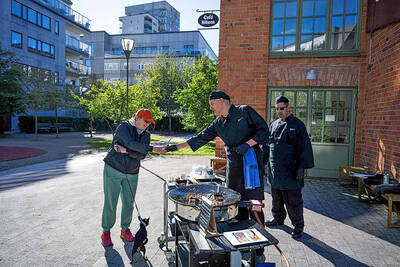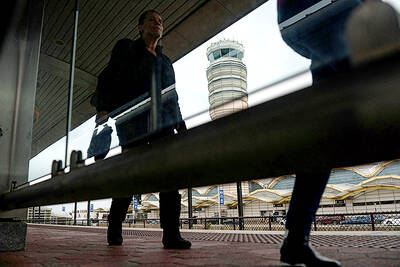A deep recession that has led to soaring unemployment and austerity cuts has failed to spark popular anger in Spain, where the unions are reluctant to put pressure on the government, analysts say.
Although May Day rallies drew tens of thousands of people protesting the crisis, they were not on a scale or intensity that could alarm the government.
Certainly, they were nothing like the violent demonstrations that erupted in debt-ridden Greece on Saturday.
“The [Spanish] trade unions have been quiet for the past several years, and now it’s difficult to get the engines started,” said Cayo Laro, the secretary general of the United Left coalition.
Spain suddenly found itself in recession in late 2008 after several years of strong economic growth based on its booming property sector.
Since then, possible motives for public anger have grown steadily.
Official data on Friday showed that the jobless rate had soared to more than 20 percent, double the eurozone average; the government this year launched an austerity plan to rein in the public deficit that includes tax rises; labor reforms are being studied and the government plans to raise the legal retirement age.
Unlike in Greece and Portugal, two eurozone countries also under pressure over their public deficits, reaction on the streets has been relatively subdued.
“There have not been any really unpopular measures taken for the moment,” said Gayle Allard, an economist at the IE business school in Madrid.
Unlike Athens and Lisbon, the socialist government of Spanish Prime Minister Jose Luis Rodriguez Zapatero has thus far shied away from freezing salaries.
In addition, “the system of unemployment benefits is much more generous” than in other countries,” sociologist Fermin Bouza said.
“Perhaps when the benefits run out, we are going to see something,” Allard said.
However, there are deeper reasons for the popular apathy.
For one thing, the unions do not want to step up popular pressure on the government.
“They think hard before sending people onto the streets,” Bouza said.
For Allard, it’s because they are “very politicized,” close to the socialist government, subsidized and “not very representative.”
“Spain is a country of small and medium-sized businesses where it is much more difficult to have union representation,” said Cristina Bermejo, secretary general of the youth wing of the CCOO union.
Another factor is family solidarity.
“The family is very strong here, each member helps others” when they are in financial trouble, Allard said.
The underground economy is also extensive, and a large number of the 4.6 million people who are officially unemployed are not in fact jobless, both Bouza and Allard said.
Allard estimated that almost 1.4 million of them work in the underground economy.
However, unions put the government on notice at Saturday’s May Day rally that things could change.
“We don’t know what imposing a restrictive budget for the year 2011 will mean,” UGT leader Candido Mendez said. “If that means reducing the guarantees for unemployment benefits, we will have a major labour conflict.”

READINESS: According to a survey of 2,000 people, 86 percent of Swedes believe the country is worth defending in the event of a military attack Swedes are stocking up on food items in case of war, as more conflict in Europe no longer feels like a distant possibility, and authorities encourage measures to boost readiness. At a civil preparedness fair in southwest Stockholm, 71-year-old Sirkka Petrykowska said that she is taking the prospect of hostilities seriously and preparing as much as she can. “I have bought a camping stove. I have taken a course on preservation in an old-fashioned way, where you can preserve vegetables, meat and fruit that lasts for 30 years without a refrigerator,” Petrykowska said. “I’ve set aside blankets for warmth, I

FRUSTRATIONS: One in seven youths in China and Indonesia are unemployed, and many in the region are stuck in low-productivity jobs, the World Bank said Young people across Asia are struggling to find good jobs, with many stuck in low-productivity work that the World Bank said could strain social stability as frustrations fuel a global wave of youth-led protests. The bank highlighted a persistent gap between younger and more experienced workers across several Asian economies in a regional economic update released yesterday, noting that one in seven young people in China and Indonesia are unemployed. The share of people now vulnerable to falling into poverty is now larger than the middle class in most countries, it said. “The employment rate is generally high, but the young struggle to

ENERGY SHIFT: A report by Ember suggests it is possible for the world to wean off polluting sources of power, such as coal and gas, even as demand for electricity surges Worldwide solar and wind power generation has outpaced electricity demand this year, and for the first time on record, renewable energies combined generated more power than coal, a new analysis said. Global solar generation grew by a record 31 percent in the first half of the year, while wind generation grew 7.7 percent, according to the report by the energy think tank Ember, which was released after midnight yesterday. Solar and wind generation combined grew by more than 400 terawatt hours, which was more than the increase in overall global demand during the same period, it said. The findings suggest it is

IN THE AIR: With no compromise on the budget in sight, more air traffic controllers are calling in sick, which has led to an estimated 13,000 flight delays, the FAA said Concerns over flight delays and missed paychecks due to the US government shutdown escalated on Wednesday, as senators rejected yet another bid to end the standoff. Democrats voted for a sixth time to block a Republican stopgap funding measure to reopen government departments, keeping much of the federal workforce home or working without pay. With the shutdown in its eighth day, lines at airports were expected to grow amid increased absenteeism among security and safety staff at some of the country’s busiest hubs. Air traffic controllers — seen as “essential” public servants — are kept at work during government shutdowns, but higher numbers